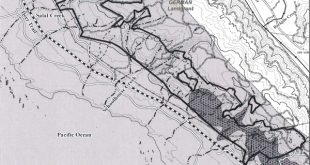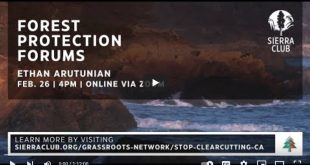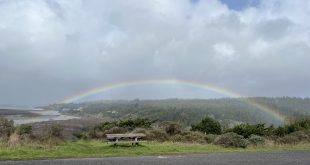Thursday, April 22, 2021 at 7pm via Zoom*
*See instructions below on how to participate via Zoom
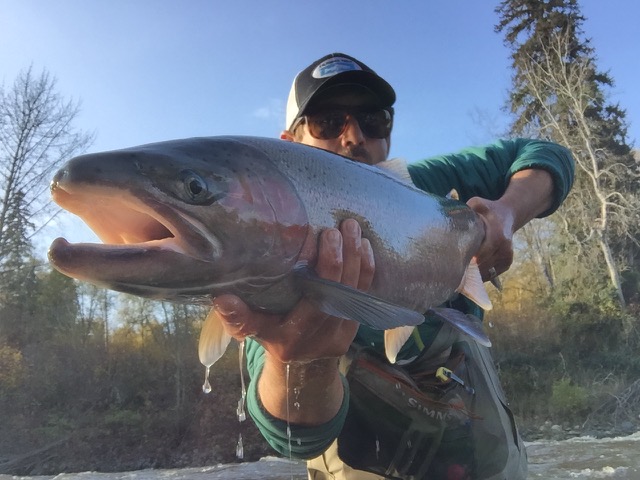
Friends of Gualala River (FoGR) will celebrate Earth Day, Thursday, April 22, 2021, with a free webinar on salmonids presented by Dr. Jacob Katz, senior scientist with California Trout.
California Trout is a non-profit dedicated to protecting and restoring the state’s 32 species of salmonid fish. Dr. Katz directs the organization’s Central California region where his work focuses on redesigning California’s antiquated water infrastructure to help restore habitat for declining salmonid populations.
Once, before the waters of the great Sacramento and San Joaquin rivers were dammed, impounded, pumped, and channeled into hundreds of miles of concrete canals in the state and federal water projects, millions of Chinook salmon swam upstream in spring and fall runs from the Pacific Ocean through the San Francisco Bay Delta to natal streams where they could spawn.
There, juvenile fish could hide from predators and feed off the rich supply of invertebrates found in the marshes and floodplains. Fattened and strengthened for the rigors of life in the ocean, they migrated back down the rivers and out to the Pacific for a period before returning to complete the cycle of life.
But today salmon teeter on the brink of extinction with their populations plummeting to a few thousand, their habitat severely reduced and degraded. Demands on water in the state are sky high, and water wars are protracted and unproductive.
Is the extinction of these iconic California natives inevitable? Or, could there be a possible solution in the notion of sharing water and habitat rather than fighting? Would flooded rice fields prove as rich a nursery as the marshes and floodplains of old? Would ranchers, farmers, and water districts be amenable to engineering a cooperative solution? California Trout and Dr. Katz seem to have found a way.
Here along the North Coast, the salmon and steelhead runs are also threatened and endangered. While our terrain and ecosystems differ from the Central Valley, the root problems are the same: extraction and degradation of water and natural resources are destroying the fish.
In the Gualala River watershed, there is the prospect of beginning salmonid restoration through the Redwood Coast Land Conservancy’s acquisition and management of the Mill Bend property in the estuary. State and federal regulators are interested. Intelligent stewardship means that much more will need to be done along the main stem of the river and upper portions of the watershed where the needs of fish will have to be integrated with working lands to reconnect and restore habitat.
Dr. Katz’s presentation is part of FoGR’s outreach program to educate the community about the extraordinary natural resources found within the Gualala River watershed and to increase awareness and commitment to its stewardship.
*HOW TO PARTICIPATE VIA ZOOM
Participation is easy. In order to attend the Earth Day talk via Zoom, please click on the link below:
We would advise you to open this link 5 minutes before the program begins, so that you can make sure that your audio and video are working properly, and in case you need to download the Zoom app (which only takes a minute or two) or to upgrade to Zoom 5.0.
If you cannot join by computer, tablet or smart phone, you can simply dial in to the number below from any telephone and listen to the presentation:
Phone #: (669) 900-6833
Meeting ID: 415 264 0957
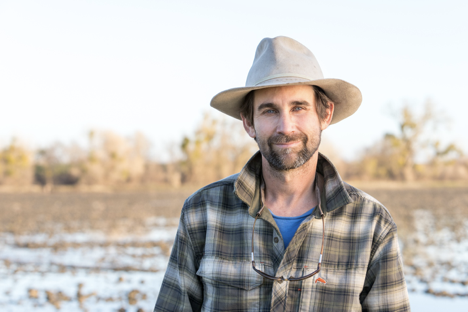
Biographical Sketch
Jacob was born with gills. Fascinated with what happened below the water line he grew up chasing fish in every creek, puddle, river and pond he could find. Eventually Jacob was hooked by school taking a PhD in ecology at the UCD Center for Watershed Sciences. He is Senior Scientist at the conservation non-profit California Trout, where his work focuses integrating ecologic science into the management and operation of California’s water infrastructure, developing ways to get greater fish and wildlife benefit out of working agricultural landscapes and finding win-win solutions for people and the environment to ensure that California will always be home to wild salmon.
Name and title: Jacob V. E. Katz, Ph.D, Lead Scientist, California Trout
Qualifications and Experience: As lead scientist at California Trout, Dr. Katz oversees science, planning, and implementation of a portfolio of landscape scale, private-public, multi-agency projects focused on the reintegration of floodplain ecosystems into the operations of California’s flood and water infrastructure. He is a principal architect of the “Reactivating Sacramento Valley Floodplains” coalition and co-founder of the Central Valley Salmon Habitat Partnership. He holds a Ph.D. from UC Davis with expertise in river function and fish ecology. Dr. Katz’s work is reshaping how the agricultural and flood control working landscapes are managed to produce greater benefit for fish and wildlife by creating win-win solutions for both people and the environment.
Education and Training:
Ph.D., Ecology, UC Davis, 2015
Bachelor of Arts, Biology, Sonoma State University, 2006
Associate of Arts, Biology, Santa Rosa Junior College, 2004
Academic/Professional Appointments:
Lead Scientist, California Trout, June 2016 – present
Director Central California Regional, Nov. 2012 – present
Principal Investigator, The Nigiri Project, Oct. 2011 – present
Scientific papers:
Jeffres, C.A., Holmes, E.J., Sommer, T.R. and Katz, J.V., (2020). Detrital food web contributes to aquatic ecosystem productivity and rapid salmon growth in a managed floodplain. PloS one, 15(9), p.e0216019.
Sommer, T., Schreier, B., Conrad, J.L., Takata, L., Serup, B., Titus, R., Jeffres, C., Holmes, E. and Katz, J., (2020) Farm to Fish: Lessons from a Multi-Year Study on Agricultural Floodplain Habitat. San Francisco Estuary and Watershed Science, 18(3).
Katz, J. V., Jeffres, C., Conrad, J. L., Sommer, T. R., Martinez, J., Brumbaugh, S., & Moyle, P. B. (2017). Floodplain farm fields provide novel rearing habitat for Chinook salmon. PloS one, 12(6)
Corline, N. J., Sommer, T., Jeffres, C. A., & Katz, J. (2017) Zooplankton ecology and trophic resources for rearing native fish on an agricultural floodplain in the Yolo Bypass California, USA. Wetlands Ecology and Management, 1-13.
Moyle, P. B., R. M. Quiñones, J. V. Katz, and J. Weaver. Fish Species Of Special Concern In California. 2015. California Department of Fish and Wildlife. https://www.wildlife.ca.gov/Conservation/Fishes/Special-Concern
Howard, J.K., K.R.Klausmeyer, K.A.Fesenmyer, J.Furnish, T.Gardali, .Grantham, J.V.Katz, S. Kupferberg, P. McIntyre, and P. B. Moyle. 2015. Patterns of Freshwater Species Richness, Endemism, and Vulnerability in California. PloS one 10:e0130710.
Katz, J., P. B. Moyle, R. M. Quiñones, J. Israel, and S. Purdy. 2013. Impending extinction of salmon, steelhead, and trout (Salmonidae) in California. Environmental Biology of Fishes 96:1169-1186.
Börk, K.S., Krovoza, J.F., Katz, J.V. and P.B. Moyle. 2012. The Rebirth of Cal. Fish & Game Code 5937: Water for Fish. University of California Davis Law Review. 45:3.
Moyle, P. B., J. V. Katz and R. M. Quiñones. 2011. of California’s inland fishes and the global freshwater extinction crisis. Biological Conservation. 144: 2414–2423 change. Ecosphere 2:4.
 Friends of Gualala River Protecting the Gualala River watershed and the species living within it
Friends of Gualala River Protecting the Gualala River watershed and the species living within it
